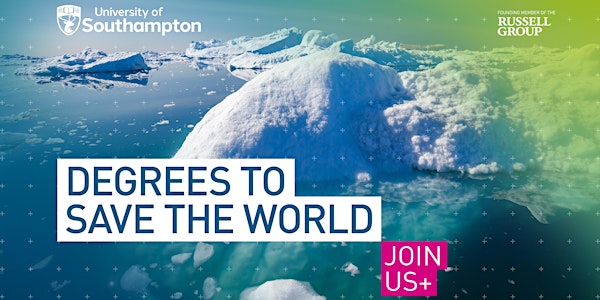
Degrees to Save the World - Ocean, Earth & the Environment
Register today for our event designed for Year 12 students; Degrees to Save the World - Ocean, Earth and the Environment!
Date and time
Location
National Oceanography Centre
University of Southampton Waterfront Campus European Way Southampton SO14 3ZH United KingdomAbout this event
From oceans to dinner plates: are microplastics a problem? Subduction zones are deadly, but can people ever live safely with the threat of geohazards? Why aren't we 'Reducing, Reusing, Recycling' - and how do we change this? And how can a map help coastal populations adapt to climate change?
Join us on Campus on Monday 27th June 2022 to learn more about the challenges facing Earth's inhabitants and how, by studying one of these key degree areas, you could help save the world. The day will run from 09.20 – 15.50 and participants will rotate through four sessions on the day (listed below) covering the following degree subjects:
- Environmental Science
- Geology, Geoscience and Geophysics
- Geography
- Oceanography and Marine Biology
The programme of the day is as follows*:
9.20am Arrival & Registration
9.40am Welcome & Introduction
10am – Keynote session: What are the UN Sustainability Goals, and how do they relate to me?
11am - Session 1
12pm - Session 2
12.50pm – Lunch
1.30pm – Session 3
2.30pm – Session 4
3.15pm - Summary – Q&A
3.50pm – End of Event
Each student attending will get to attend all of the four different sessions:
"Reduce, reuse, recycle: opportunities for sustainable use of resources?"
(Environmental Science)
The global population continues to produce, consume and throw away consumer products at an alarming rate. We understand how this behaviour leads to adverse environmental impacts and we know how we reduce these impacts, so why do we continue to behave in this way and how can we change what we do to lead to a more sustainable future?
"Sumatran Subduction Zone – earthquakes, volcanoes and landslides."
(Geology. Geoscience and Geophysics)
Subduction zones play host to some of the deadliest geohazards on our planet: earthquakes, tsunami, volcanic eruptions and landslides. In 2004 a Mw 9.1 earthquake at the Sumatran Subduction Zone, and the resulting tsunami, resulted in the deaths of an estimated 230,000 people around the Indian Ocean. Studying geohazards is the key to finding ways to mitigate their impact on populations around the globe.
"How can studying people help to solve environmental problems?"
(Geography)
Take a look at how studying the interests and complicated relationships of people and organisations can help to tackle environmental issues. Participants will be introduced to the concept of stakeholders and will learn to conduct a stakeholder analysis, using the emerging hazard of sargassum seaweed influxes in the Caribbean as a case study.
"An ocean of plastic."
(Oceanography and Marine Biology)
Plastic pollution is widespread in our oceans and could potentially end up on our dinner plates. Come and explore an 'ocean of plastic' by looking for evidence of microplastics in local samples and test whether they are passed through the marine food chain. This session offers hands-on experience of a contemporary topic affecting ocean and human health.
*This programme may be subject to change due to staff availability and other limitations. The final programme will be confirmed shortly before the event.